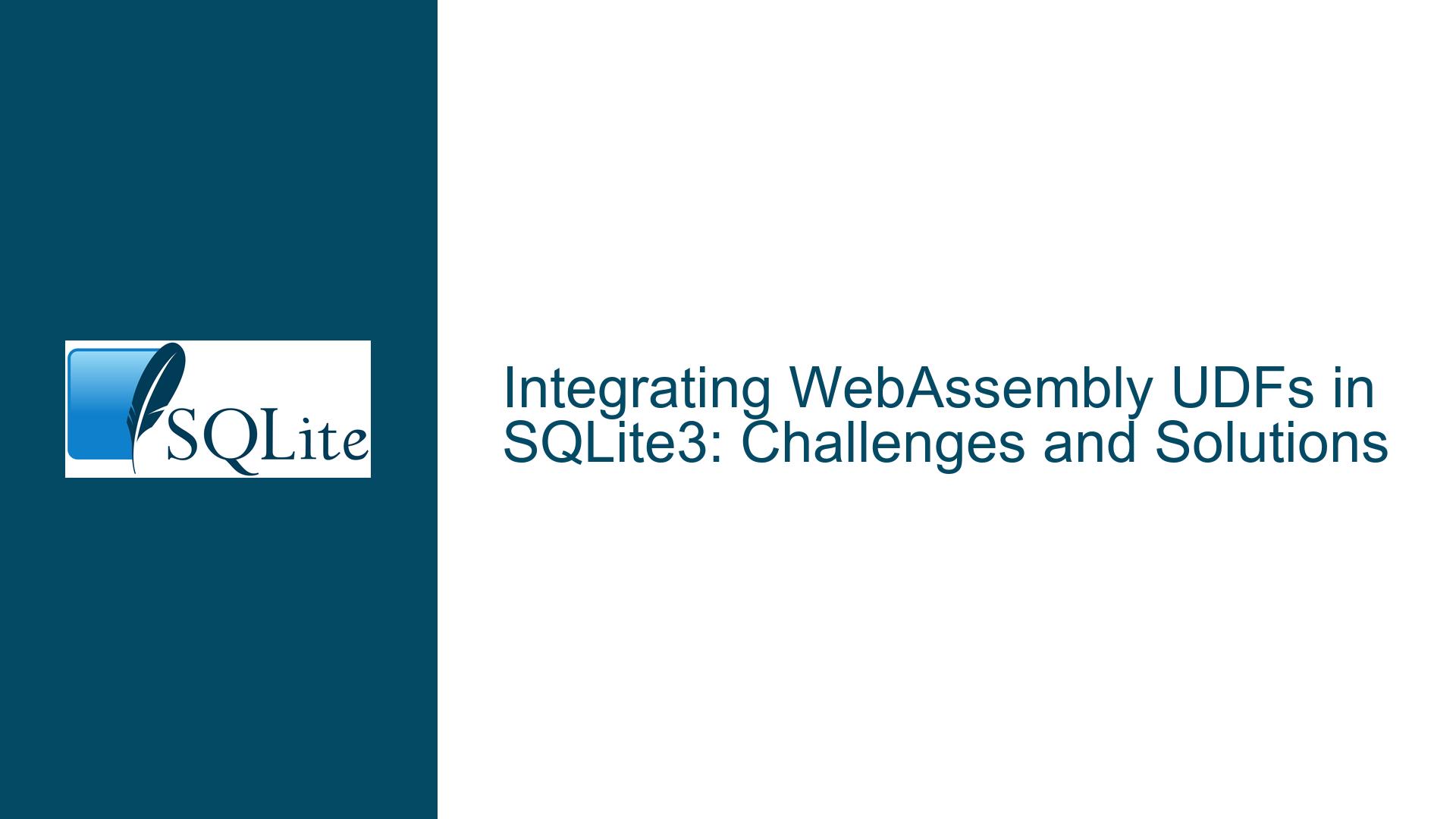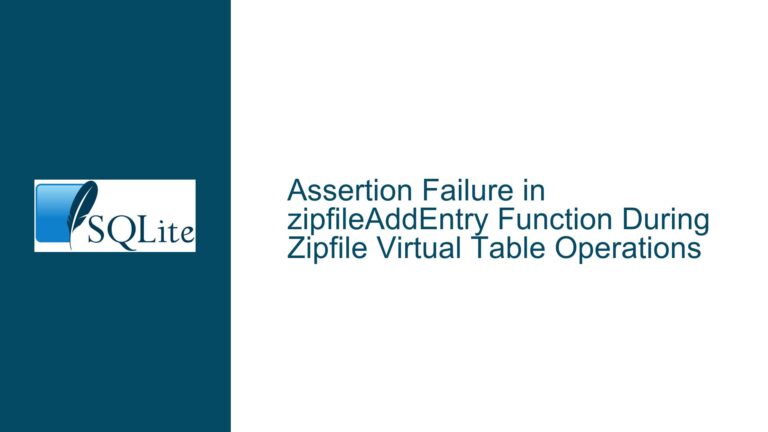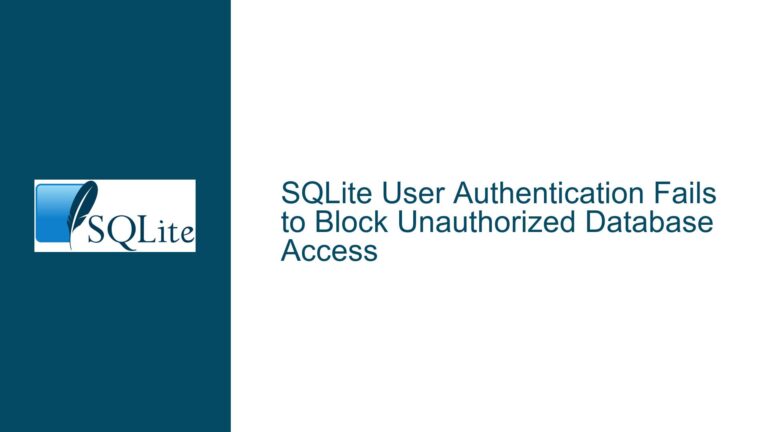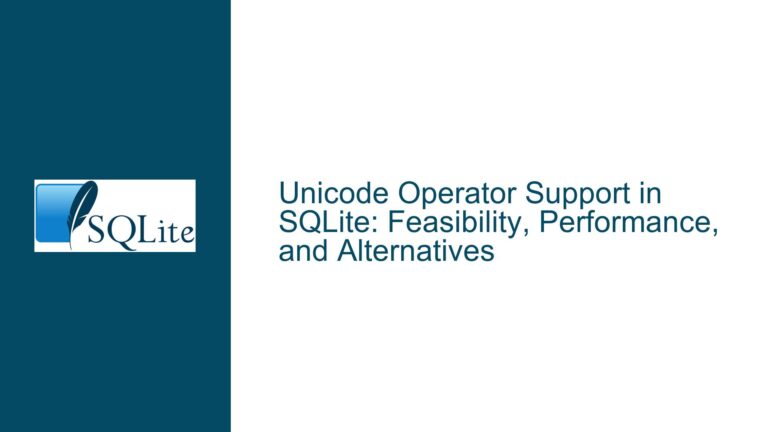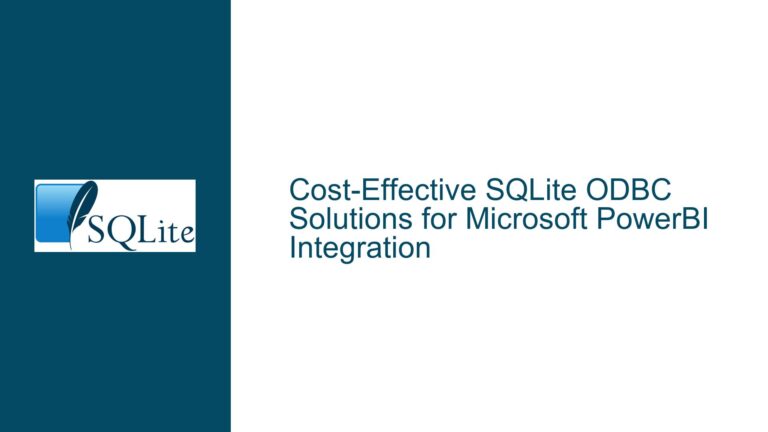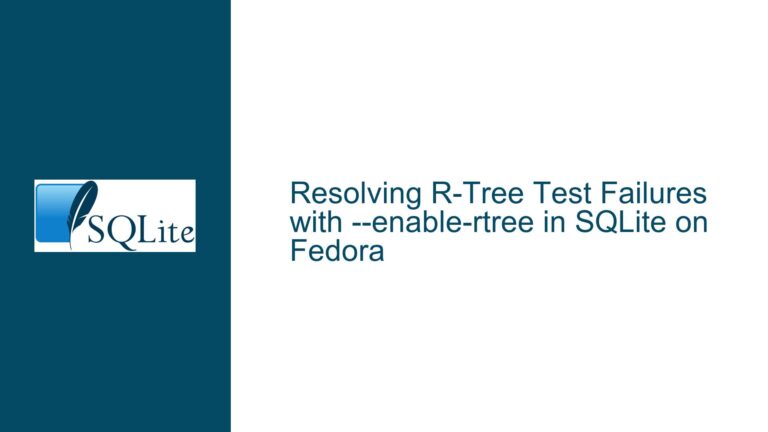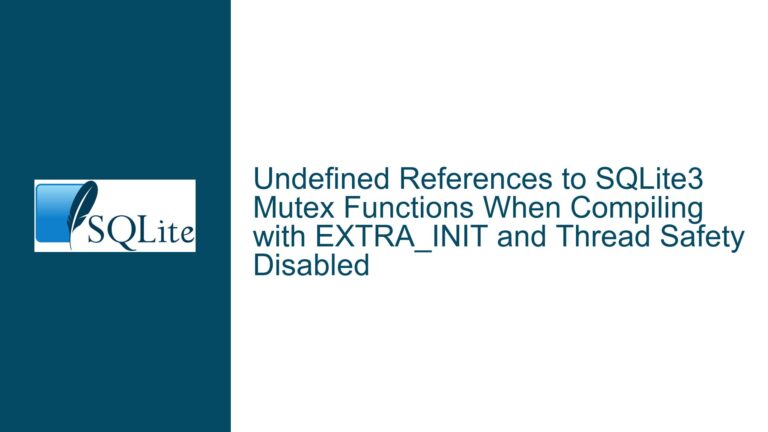Integrating WebAssembly UDFs in SQLite3: Challenges and Solutions
Feasibility of WebAssembly UDF Integration in SQLite3
The prospect of integrating WebAssembly (WASM) as a platform for User-Defined Functions (UDFs) in SQLite3 hinges on its ability to execute sandboxed, portable code while interfacing with SQLite’s internal data structures. SQLite3’s extensibility model allows for UDFs written in C, but extending this to support WASM requires bridging the gap between SQLite’s native C API and the WASM runtime environment. WASM’s design as a stack-based virtual machine makes it theoretically compatible with SQLite3’s UDF system, but practical implementation faces architectural and operational hurdles.
A critical factor is SQLite3’s lack of a built-in WASM runtime. UDFs in SQLite3 are typically compiled into the host application or loaded as dynamic extensions. For WASM-based UDFs to function, the host environment (SQLite3 or its extension) must embed a WASM interpreter or compiler, such as Wasmer, WAMR, or a custom runtime. This dependency introduces complexity, as the runtime must manage memory allocation, function exports/imports, and type conversions between SQLite3’s native data types (e.g., sqlite3_value) and WASM’s linear memory model.
The LibSQL fork demonstrates a proof-of-concept by embedding a WASM runtime directly into its modified SQLite engine. This approach allows UDFs written in WASM to interact with database operations through predefined host functions. However, LibSQL’s implementation is not backward-compatible with official SQLite3 builds, as it modifies core components to enable WASM integration. For unmodified SQLite3, a standalone extension would need to replicate similar functionality without altering the core library—a significant challenge given SQLite3’s deliberate minimalism and lack of runtime plugin interfaces for low-level WASM interactions.
Another consideration is performance. WASM execution introduces overhead compared to native C UDFs, especially for computationally intensive tasks. While WASM’s near-native speed mitigates this, the cost of context switching between SQLite3’s C stack and the WASM runtime’s memory space could degrade performance for high-frequency UDF calls. Optimizations like ahead-of-time (AOT) compilation of WASM modules or Just-In-Time (JIT) acceleration might alleviate this, but these features are not universally supported across all environments where SQLite3 operates (e.g., embedded systems).
Architectural and API Limitations in WASM UDF Implementation
The primary obstacle to WASM UDFs in SQLite3 is the absence of a direct mechanism for WASM modules to interface with SQLite3’s internal APIs. SQLite3 UDFs rely on C-language functions that receive arguments as sqlite3_value pointers, which encapsulate data types, collations, and error states. WASM modules, however, operate in a memory-isolated environment and cannot natively dereference C pointers or access SQLite3’s internal data structures. This necessitates a "shim" layer to marshal data between SQLite3 and the WASM runtime.
For example, when a WASM UDF is invoked, the shim layer must:
- Extract values from
sqlite3_valueobjects and serialize them into a format compatible with WASM’s linear memory (e.g., strings as offsets into a shared buffer). - Invoke the WASM function via its exported symbol, passing serialized arguments.
- Capture the return value from WASM, deserialize it into a
sqlite3_resulttype (e.g.,sqlite3_result_text), and handle any exceptions or traps generated by the WASM module.
This marshaling process introduces complexity and performance costs. Additionally, WASM modules cannot directly access SQLite3’s utility functions (e.g., sqlite3_malloc, sqlite3_free), requiring the host extension to proxy memory management operations. Without such proxies, WASM UDFs would be limited to pure computational tasks without side effects—severely restricting their utility for tasks like XML processing or file format conversion, which often require dynamic memory allocation.
Another limitation is the lack of threading support in WASM. SQLite3 allows UDFs to be marked as thread-safe using SQLITE_THREADSAFE, but WASM’s current threading model is experimental and not widely supported. This could lead to concurrency issues if a WASM UDF is called simultaneously from multiple threads in a multi-threaded SQLite3 configuration. Mitigating this would require the host extension to implement locking mechanisms around WASM runtime access, further complicating the architecture.
Strategies for Implementing WASM UDFs in SQLite3
To integrate WASM UDFs into SQLite3, developers can pursue one of three strategies: creating a custom extension with an embedded WASM runtime, modifying SQLite3’s core to include WASM support, or leveraging existing forks like LibSQL. Each approach has trade-offs in complexity, portability, and performance.
1. Custom Extension with Embedded WASM Runtime
A standalone SQLite3 extension can embed a lightweight WASM runtime (e.g., Wasm3 or WAMR) to execute UDFs. The extension would register C functions that act as bridges between SQLite3 and WASM modules. For example:
// Pseudocode for extension initialization
sqlite3 *db;
sqlite3_open(":memory:", &db);
wasm_runtime_init();
// Load WASM module from disk
uint8_t *wasm_buf = read_wasm_module("udf.wasm");
wasm_module_t module = wasm_runtime_load(wasm_buf);
// Register UDF
sqlite3_create_function(
db, "wasm_udf", 1, SQLITE_UTF8, NULL,
&wasm_udf_handler, NULL, NULL
);
// UDF handler pseudocode
void wasm_udf_handler(
sqlite3_context *ctx,
int argc,
sqlite3_value **argv
) {
// Serialize argv[0] to WASM memory
char *input = sqlite3_value_text(argv[0]);
uint32_t input_offset = copy_to_wasm_memory(input);
// Invoke WASM function
wasm_function_t func = wasm_runtime_lookup_function(module, "udf");
wasm_val_t args[] = { { .i32 = input_offset } };
wasm_val_t result;
wasm_runtime_call(func, args, &result);
// Deserialize result and return to SQLite
char *output = read_from_wasm_memory(result.i32);
sqlite3_result_text(ctx, output, -1, SQLITE_TRANSIENT);
}
This approach avoids modifying SQLite3’s core but requires meticulous handling of memory ownership and error propagation. Developers must also distribute the extension with the WASM runtime binaries, increasing deployment complexity.
2. Modifying SQLite3 Core for WASM Support
Embedding a WASM runtime directly into SQLite3’s core would enable tighter integration, such as exposing sqlite3_value internals to WASM modules via imported functions. For example, a modified SQLite3 could expose:
// Hypothetical SQLite3 WASM API
int32_t sqlite3_wasm_value_type(sqlite3_value *value);
int32_t sqlite3_wasm_value_text(sqlite3_value *value, char *buf, int32_t len);
WASM modules could then import these functions and interact with SQLite3 values directly. However, this strategy demands deep familiarity with SQLite3’s internals and would likely face resistance from upstream maintainers due to increased binary size and maintenance burden.
3. Adopting LibSQL’s WASM UDF Implementation
LibSQL, a fork of SQLite3, has already implemented WASM UDF support. Developers can study its codebase to understand how it wires the Wasmtime runtime into SQLite3’s UDF system. Key components include:
- Host Environment Initialization: LibSQL initializes a WASM runtime during database connection setup.
- Module Caching: Precompiled WASM modules are cached to avoid re-parsing overhead.
- Sandboxing: Restrictions on WASM module system calls to prevent malicious behavior.
While LibSQL provides a working reference, porting its features to official SQLite3 would require reconciling differences in build systems, API stability, and licensing (LibSQL uses the MIT License vs. SQLite3’s public domain).
Performance Optimization and Security Considerations
Optimizing WASM UDF Execution
- AOT Compilation: Tools like
wasm2ccan transpile WASM modules to C code, which can then be compiled into native UDFs. This eliminates runtime interpretation overhead but sacrifices portability. - Memory Pooling: Reusing WASM memory buffers between UDF calls reduces allocation overhead. For example, pre-allocating a 64KB memory pool and resetting it per query.
- Batched Execution: Processing multiple rows in a single WASM call amortizes context-switching costs. This requires designing UDFs to accept arrays of inputs and return arrays of results.
Security Implications
- Sandboxing: Untrusted WASM UDFs must be isolated from the host system. Techniques include disabling WASI (WebAssembly System Interface) system calls and limiting memory usage via runtime configuration.
- Input Validation: All data passed from SQLite3 to WASM must be validated to prevent buffer overflows or type confusion attacks. For example, ensuring strings are null-terminated and within declared length bounds.
- Resource Quotas: Enforcing limits on CPU cycles and memory consumption per UDF invocation prevents denial-of-service attacks. The WASM runtime must support interruption hooks for long-running functions.
Conclusion and Future Directions
Implementing WASM UDFs in SQLite3 is feasible but demands careful engineering to address API incompatibilities, performance bottlenecks, and security risks. Developers should prioritize use cases where WASM’s portability and language-agnosticism justify the overhead, such as cross-platform analytics functions or cryptographic operations. Community-driven projects like LibSQL offer valuable insights, but mainstream adoption depends on upstream support for a lightweight, optional WASM runtime in SQLite3’s core. Until then, custom extensions remain the most pragmatic path for early adopters willing to navigate the technical complexities.
